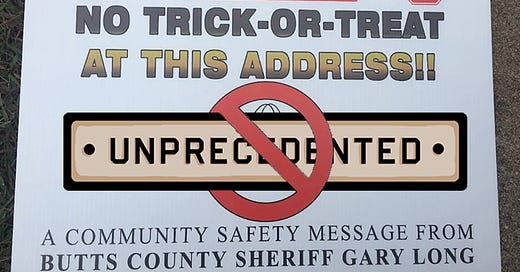Do sex offenders have free speech rights?
A rogue sheriff might mean well, but can he force sex offenders to put a sign on their lawns?
The 2018 Halloween festival was canceled that year in Butts County, Georgia. But October 31 was coming regardless, which meant instead of congregating in the county square, the children would be walking through the neighborhood door-to-door.
This was a problem for Sheriff Gary Long. He knew that dozens of registered sex offenders lived in the community. He knew he had to do something.
Long directed two of his deputies to drive around the county, to put up signs at the homes of known offenders. “WARNING!” the signs said. “NO TRICK-OR-TREAT AT THIS ADDRESS!!”
Along with the signs, the deputies delivered a leaflet letting the resident know that the signs were the property of Sheriff Long, and could only be removed by the Butts County Sheriff’s Office.
Sheriff Long meant well. But the residents in question felt their First Amendment rights had been violated. In January of this year, a federal court of appeals agreed. First Amendment protection “includes both the right to speak freely and the right to refrain from speaking at all,” they wrote.
At first glance, it seems like an absurd result. How could multiple judges from the 11th Circuit Court of Appeals find that, in trying to protect the children of the community, Sheriff Long had violated the Constitution? Where in the Constitution — where in the First Amendment — does it say you’re not allowed to put up a sign warning parents to keep their kids away from the homes of sexual offenders?
The First Amendment is only 45 words, and precious few have anything to do with speech: “Congress shall make no law … abridging the freedom of speech.” That’s it. Unfortunately, the Founding Fathers didn’t offer much additional guidance, so Americans have to depend on judges — and ultimately the nine justices of the Supreme Court — to determine exactly what that phrase means.
Over the years, the justices have decided that a constitutional right to speak your mind implies a corollary: the right to be free from speech you disagree with — in this case, a tiny billboard notifying the community of a crime you committed in the past. Sheriff Long might have had the best of intentions, but good intentions aren’t enough to outweigh a fundamental right.
(The first court to review the case found in favor of the government, agreeing with its argument that the residents were “free to disagree by posting a competing message.” The court of appeals pilloried that response, which it called “post-a-second-sign” reasoning: “If the only constitutional requirement for the government to compel citizens to host its speech on their private property is that it also permits them to post a second sign disagreeing with the first, the Sheriff could place any sign identifying himself as the speaker in any county resident’s yard.”)
Reasonable minds can differ on whether sexual offenders should be allowed to receive trick-or-treaters, or on whether it’s a good idea in general for signs to be posted indicating a sex offender lives at this address. But for over 40 years now, one principle has been clear: The government generally cannot force private citizens to display a message.
Although the First Amendment says nothing about the right not to speak, the Supreme Court has held that it’s implicit within the meaning of the text itself. In 1977, the high court found that the right to speak and the right to refrain from speaking “are complementary components of the broader concept of individual freedom of mind.”
That’s a quote from Wooley v. Maynard, a seminal case cited by virtually every major court decision on compelled speech. The first episode of Unprecedented (People Think They’re Living In a Free Country) explores that case in detail, as we speak with George Maynard about a government mandate that led to his imprisonment — and subsequent vindication.
Forty years after Wooley, the Supreme Court tackled a related but much more sensitive question: Can a state force a pro-life pregnancy center to post flyers in its lobby advertising abortion services? That’s the subject of the second episode of Unprecedented (Not Alone In My Own Body).
The First Amendment protects a lot of speech — and a lot of people — that we might not agree with. But in a country of over 300 million, we won’t always agree on everything, or even on most things. That’s why it’s so important for us all to be able to speak our minds — or, if we’re so inclined, to say nothing at all.
Matthew S. Schwartz is executive producer of Unprecedented, and a graduate of the Georgetown University Law Center.




Does this suggest that publishing information freely available to the public (on a City web site, for instance) could not be posted on public land (for instance on the sidewalk outside a sex offenders property line?